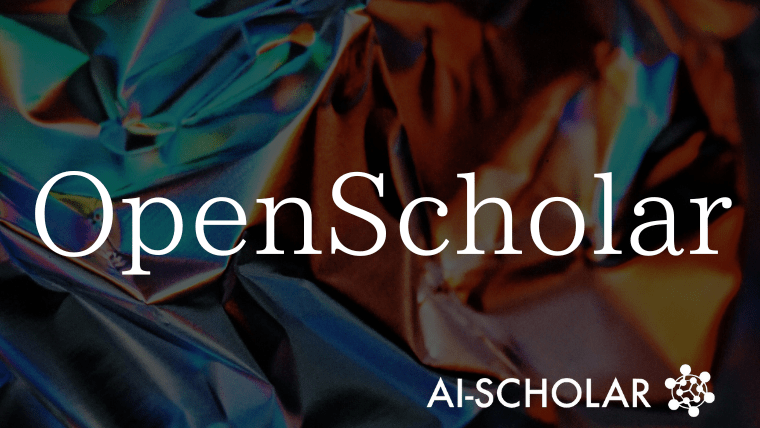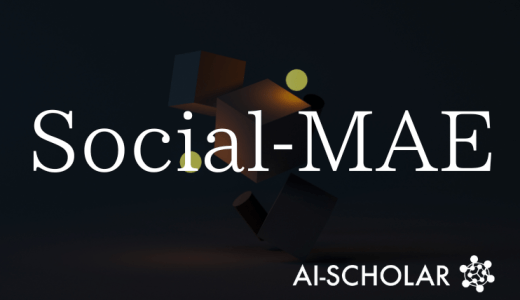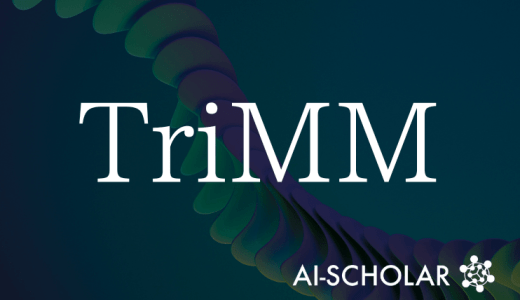
OpenScholar: Knowledge Synthesis And Reliability Enhancement Of Scientific Literature With LLM
3 main points
✔️Proposed "OpenScholar" to generate highly accurate answers using scientific literature.
✔️A new benchmark, ScholarQA/BENC, has also been developed to evaluate LLM responses.
✔️The system is expected to be applied to literature review support as a mechanism for researchers to efficiently obtain reliable information.
OpenScholar: Synthesizing Scientific Literature with Retrieval-augmented LMs
written by Matthias Minderer, Alexey Gritsenko, Austin Stone, Maxim Neumann, Dirk Weissenborn, Alexey Dosovitskiy, Aravindh Mahendran, Anurag Arnab, Mostafa Dehghani, Zhuoran Shen, Xiao Wang, Xiaohua Zhai, Thomas Kipf, Neil Houlsby
(Submitted on 21 Nov 2024)
Comments: Published on arxiv.
Subjects: Computation and Language (cs.CL); Artificial Intelligence (cs.AI); Digital Libraries (cs.DL); Information Retrieval (cs.IR); Machine Learning (cs.LG)
code:

The images used in this article are from the paper, the introductory slides, or were created based on them.
Overview
This paper proposes a novel approach for knowledge synthesis using scientific literature. In particular, we aim to effectively collect and apply information by utilizing Retrieval-Augmented LMs (Retrieval-Augmented LLMs).
The main focus of the project is the "OpenScholar" system. This effectively retrieves pre-selected scientific literature and uses that information to generate quality responses to questions. This method is important for improving the accuracy and reliability of the information.
The paper also develops a tool called ScholarQA/BENC, a new benchmark for evaluating Model performance. This allows us to efficiently evaluate the quality and range of Model responses.
In addition, the development of datasets and training methods are described in detail. This provides a powerful foundation for not just retrieving information, but for properly understanding and applying that information.
Ultimately, the system improves access to knowledge in scientific research and enables users to perform tasks such as literature reviews more efficiently.
Research Background
This paper describes the efficient construction of knowledge from scientific literature. In scientific research and education, it is becoming increasingly important to make reliable information quickly accessible. Therefore, this study proposes a system called "OpenScholar" that uses a method called Retrieval-Augmented Language Models (LMs).
OpenScholar is designed to generate high-quality answers to specific questions. To achieve this, it first retrieves relevant data and then reconstructs it to provide more accurate information. In addition, the system further improves the reliability of the information by providing enhanced links to cited references.
A key feature of the system is that it enhances the quality of responses in specific areas by training particularly specialized LLMs. In the evaluation, specific evaluation criteria are used to ensure the accuracy and comprehensiveness of the answers. In particular, by incorporating feedback from experts, the LLM has demonstrated high performance in diverse scientific domains. This is expected to lead to breakthroughs in scientific knowledge aggregation and information provision.
Proposed Methodology
In this paper, we propose a framework called "OpenScholar" that leverages a retrieval-enhanced LLM as a method for generating scholarly literature. information more efficiently.
The method uses Retrieval-Augmented Mechanisms to pull information from large academic databases in advance, making it easier to access the information needed. This process is intended to enhance the reliability of responses to questions and provide relevant and relevant information to users.
OpenScholar also incorporates a system in which the quality of the text generation is evaluated by human experts. This allows them to verify that the information generated meets actual academic standards and to make improvements as needed.
Furthermore, the paper claims that OpenScholar is more efficient and accurate than traditional methods. The paper also provides specifics on how sentences generated using the extracted information can be used in information retrieval.
The paper demonstrates that this method could be useful for researchers who need a great deal of information in a limited amount of time.
Experiments
We are sorry, but we are unable to read the details from the material images provided. However, we can describe the content of the paper in general, especially those dealing with machine learning.
The paper is an experiment that utilizes LLM and investigates its applications and limitations. In particular, it provides a detailed analysis of how the technology is effective at solving specific problems and strategies for improving its performance; LLMs are valued for their ability to learn and generate models from vast amounts of data, and to respond and make predictions in natural, human-like language.
Experiments in the paper quantitatively evaluated how LLM performs in specific tasks. Tuning and optimization techniques to further improve performance are also examined. The results provide insight into the applicability of LLMs in a variety of domains.
In summary, the paper presents the progress of applied research around LLMs and identifies room for improvement and challenges. It is hoped that this will lead to further technological developments and new application possibilities.
Conclusion
This paper proposes a new method for evaluating the quality of responses produced by large-scale language models (LLMs) and comparing them to other academic responses. Specifically, it evaluates the degree of agreement between accurate responses annotated by experts and those generated by the model. This method is particularly useful in the context of question-answering in academic papers.
The paper also sets forth several evaluation criteria, including accuracy of answers and appropriateness of citations. One advantage is that it allows for rapid responses to a wide variety of questions by utilizing a sophisticated language model. This allows researchers to obtain the necessary information in a short period of time and conduct research efficiently.
However, it is also necessary to be critical of the model. For example, the answers generated by the model do not necessarily reflect the latest research, which may raise questions about the accuracy of the information. Nonetheless, the proposed evaluation methodology is useful as one objective measure of LLM performance and will guide future research.
Categories related to this article








